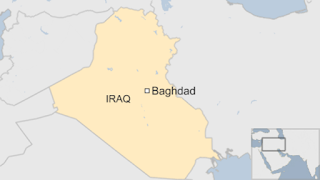January 2016
Political dispute is rising
in Baghdad over the fate of the Popular Mobilization Force (PMF), including
armed Shiite militias formed under a fatwa issued by Shiite Grand Ayatollah Ali
Sistani in the summer of 2014 to take on the threat of ISIS.
Sunni political groups are
accusing the Shiite militias of seeking violence and widespread sectarian
vengeance in Iraq, similar to the scenes of 2005, 2006 and 2007, especially in
Baghdad and Diyala Province.
Sunni politicians in their
remarks have warned that Shiite militias might eventually begin assassinating
Iraqi Sunni leaders and Shiite political figures opposing the PMF. The Sunni
politicians said a number of moderate Shiite alliance figures who have clear
nationalist stances might become assassination targets, especially those who
advised Iraqi Prime Minister Haider al-Abadi to be firm against the Shiite PMF
or dissolve them if needed.
The recent abduction of three
Americans in the Addora neighborhood of southern Baghdad is a dangerous turn of
events in the role of various despotic
elements inside the armed Shiite groups fighting under the PMF framework. This
abduction may come with a political message for the U.S. and international
coalition, some have mentioned.
Dispatching U.S. Special Forces to
areas of Iraq and American bombers mistakenly bombing the PMF near the city of
Fallujah located west of Baghdad have led to deteriorating relations between
the Americans and the PMF, which has already been full of tension.
The U.S. may decide to target
the Shiite groups if the three Americans remain hostage in the hands of the
groups or factions active under the PMF flag. U.S. diplomats have discussed
with al-Abadi the dangers of rising Shiite militia influence, especially their
direct relations with Iran bypassing the Iraqi government.
The American perspective
presented to al-Abadi included a clear reference to Iran’s role in
strengthening Shiite militias’ influence at the Iraqi government’s expense. The
Americans also presented intelligence to al-Abadi showing there are parties in
Iran that are behind the events taking place in the town of Meqdadiya in Diyala
Province located northeast of Baghdad.
On planning to abduct or
murdering the three American military personnel by the Shiite militias, if such
claims are proven the PMF – like ISIS – may become a target for international
coalition airstrikes. Therefore, the al-Abadi government should not relieve
this matter without a firm and decisive resolve.
For a number of reasons there
are doubts over al-Abadi’s power to take a firm position vis-à-vis the Shiite
militias. The most important matter is that a number of Shiite alliance
officials directing the Iraqi government consider these militias as a red line.
Furthermore, it appears that al-Abadi’s influence inside his coalition (State
of Law coalition) and party (Dawa Party) is weaker in comparison to his
archrival, former prime minister Nouri al-Maliki.
On the other hand, Revolutionary
Guards commander Mohammad Ali Taheri in Iran has said in his recent speech in
Tehran that the PMF in Iraq and Syria are our red line and no one can even
think about crossing these red lines.
Considering the situation in
Iraq and the paradox between the Shiite militias and al-Abadi, one cannot
expect a clear image of the status quo in Iraq. If the Americans fail to
dispatch ground forces to Iraq the status quo will deteriorate day by day. It
appears Washington has come to realize this issue very well and the entrance of
the 101st Airborne Division to Iraq is in line with such a
perspective.

No comments:
Post a Comment